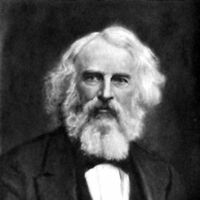Tales of a Wayside Inn: Part 3. Interlude III.
Thus ran the Student’s pleasant rhyme
Of Eginhard and love and youth;
Some doubted its historic truth,
But while they doubted, ne’ertheless
Saw in it gleams of truthfulness,
And thanked the Monk of Lauresheim.
This they discussed in various mood;
Then in the silence that ensued
Was heard a sharp and sudden sound
As of a bowstring snapped in air;
And the Musician with a bound
Sprang up in terror from his chair,
And for a moment listening stood,
Then strode across the room, and found
His dear, his darling violin
Still lying safe asleep within
Its little cradle, like a child
That gives a sudden cry of pain,
And wakes to fall asleep again;
And as he looked at it and smiled,
By the uncertain light beguiled,
Despair! two strings were broken in twain.
While all lamented and made moan,
With many a sympathetic word
As if the loss had been their own,
Deeming the tones they might have heard
Sweeter than they had heard before,
They saw the Landlord at the door,
The missing man, the portly Squire!
He had not entered, but he stood
With both arms full of seasoned wood,
To feed the much-devouring fire,
That like a lion in a cage
Lashed its long tail and roared with rage.
The missing man! Ah, yes, they said,
Missing, but whither had he fled?
Where had he hidden himself away?
No farther than the barn or shed;
He had not hidden himself, nor fled;
How should he pass the rainy day
But in his barn with hens and hay,
Or mending harness, cart, or sled?
Now, having come, he needs must stay
And tell his tale as well as they.
The Landlord answered only: ‘These
Are logs from the dead apple-trees
Of the old orchard planted here
By the first Howe of Sudbury.
Nor oak nor maple has so clear
A flame, or burns so quietly,
Or leaves an ash so clean and white;’
Thinking by this to put aside
The impending tale that terrified;
When suddenly, to his delight,
The Theologian interposed,
Saying that when the door was closed,
And they had stopped that draft of cold,
Unpleasant night air, he proposed
To tell a tale world-wide apart
From that the Student had just told;
World-wide apart, and yet akin,
As showing that the human heart
Beats on forever as of old,
As well beneath the snow-white fold
Of Quaker kerchief, as within
Sendal or silk or cloth of gold,
And without preface would begin.
And then the clamorous clock struck eight,
Deliberate, with sonorous chime
Slow measuring out the march of time,
Like some grave Consul of old Rome
In Jupiter’s temple driving home
The nails that marked the year and date.
Thus interrupted in his rhyme,
The Theologian needs must wait;
But quoted Horace, where he sings
The dire Necessity of things,
That drives into the roofs sublime
Of new-built houses of the great
The adamantine nails of Fate.
When ceased the little carillon
To herald from its wooden tower
The important transit of the hour,
The Theologian hastened on,
Content to be allowed at last
To sing his Idyl of the Past.

